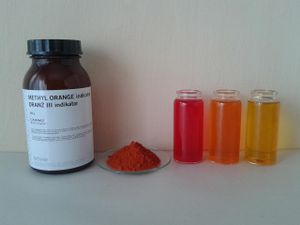Methyl orange
 Methyl orange in solid form and as solution at pH < 3.1 (red), pH 3.1-4.4 (orange) and pH > 4.4 (yellow)
| |
| Names | |
|---|---|
| Preferred IUPAC name
Sodium 4-{[4-(dimethylamino)phenyl] diazenyl} benzene-1-sulfonate | |
| Other names
C.I. Acid Orange 52
Eniamethyl Orange Gold Orange Helianthine Orange III Sodium 4-[(4-dimethylamino)phenylazo]benzenesulfonate | |
| Properties | |
| C14H14N3NaO3S | |
| Molar mass | 327.33 g/mol |
| Density | 1.28 g/cm3 |
| Melting point | 300 °C (572 °F; 573 K) (decomposes) |
| Boiling point | Decomposes |
| 0.5 g/100 ml (20 °C) | |
| Solubility | Slightly soluble in ethanol Insoluble in butanol, diethyl ether, glycerol, isobutanol, toluene, xylene |
| Solubility in 2-methoxyethanol | 2 g/100 ml |
| Solubility in ethanol | 0.03 g/100 ml |
| Hazards | |
| Safety data sheet | Sigma-Aldrich |
| Lethal dose or concentration (LD, LC): | |
| LD50 (Median dose)
|
60 mg/kg (rat, oral) |
| Related compounds | |
| Related compounds
|
Methyl red Methyl yellow |
| Except where otherwise noted, data are given for materials in their standard state (at 25 °C [77 °F], 100 kPa). | |
| Infobox references | |
Methyl orange is an organic chemical compound used as pH indicator in titrations. Because it changes colour at the pH of a midstrength acid, it is usually used in titrations for acids.
Contents
Properties
Chemical
Methyl orange turns red in strong acidic solutions and yellow at high pH. In the presence of xylene cyanol, it turns acidic solutions mauve and alkaline green.
Physical
Methyl orange is a light orange powder, slightly soluble in water and ethanol, but more soluble in pyrimidine.
Availability
Methyl orange can be bought from chemical suppliers or online, from eBay or Amazon.
Preparation
Ozonelabs wrote a synthesis of methyl orange. It can be downloaded here.
Methyl orange is cheaper to purchase than synthesize yourself.
Projects
- pH indicator
Handling
Safety
Methyl orange will stain most objects. It is also toxic if ingested. Studies have shown to be mutagen. Proper protection should be worn when handling the compound.
Storage
In closed bottles, away from acids and volatile compounds.
Disposal
Methyl orange should be destroyed with a strong oxidizer, such as piranha solution, Fenton's reagent or chromic acid. This neutralizes it to carbon dioxide, water and salt. Excess oxidizer is then neutralized and checked for any leftover methyl orange; the leftover solution can then be safely poured down the drain.